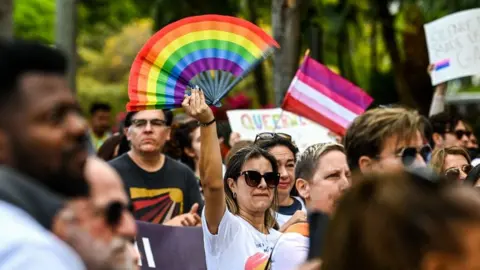Florida settles lawsuit over LGBT education bill
 CHANDAN KHANNA
CHANDAN KHANNAGender identity and sexual orientation can be discussed in Florida classrooms as long as it is not a part of formal instruction, a legal settlement says.
The settlement, announced on Monday, clarifies the scope of a controversial state education law, but left it standing.
Plaintiffs had challenged Florida's 2022 parental rights bill, arguing it could marginalise LGBT youth.
Both Florida officials and the plaintiffs claimed victory on Monday.
Roberta Kaplan, the lead lawyer in the lawsuit, said in a statement that the legal settlement provides "much-needed clarity" and "represents a major victory for the many thousands of LGBTQ+ students, teachers, parents, and their allies throughout Florida".
Florida Governor Ron Desantis's office called it a "major win".
"We fought hard to ensure this law couldn't be maligned in court, as it was in the public arena by the media and large corporate actors," said general counsel Ryan Newman.
The Parental Rights in Education Act - dubbed by critics as the "Don't Say Gay" bill - initially prohibited classroom discussion and instruction about gender identity and sexual orientation in kindergarten through third grade in state public schools.
That was later expanded to all grades through high school.
The law sparked a political firestorm, receiving rebuke from LGBT and civil rights groups as well as from major companies like Disney, which has a large presence in the state, and President Joe Biden.
The plaintiffs challenging the law argued its vague language would have a chilling effect in schools and lead to confusion about what teachers were allowed to discuss with their students, including things like sharing details about their family lives.
Mr DeSantis, a Republican, has claimed critics deliberately misrepresented the law.
Now, the settlement clarifies that the law "restricts instruction on particular subjects (sexual orientation and gender identity) not mere discussion of them".
Allowed under the law are "incidental" references in literature to gay or transgender people or same-sex couples.
It would also not restrict "lines referring to LGBTQ issues" in musicals, "dancing between persons of the same gender" at school dances, or references in a classroom to a person's family.
It doesn't apply to library books not being used in instruction, and it allows students to participate in extracurricular activities like joining a school Gay-Straight Alliance.
It also clarifies the law is "neutral", meaning limits on instruction apply to both LBGT and heterosexual topics.
According to the terms of the settlement, the Florida Department of Education must provide a copy of the agreement and the guidelines it establishes to the school boards in each state school district.
